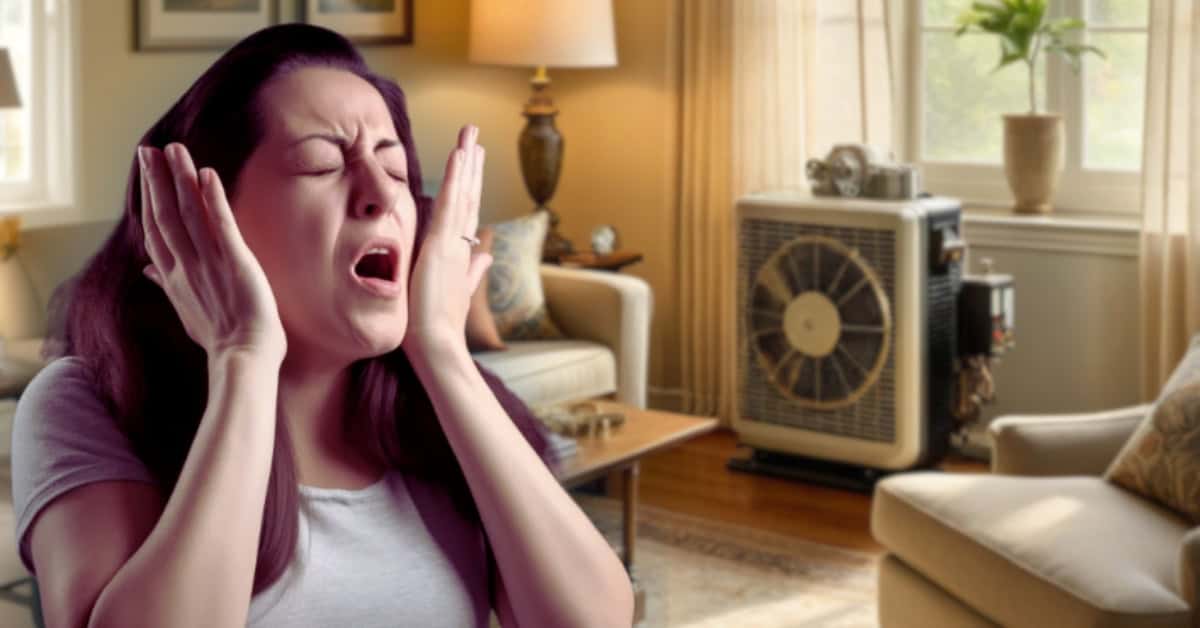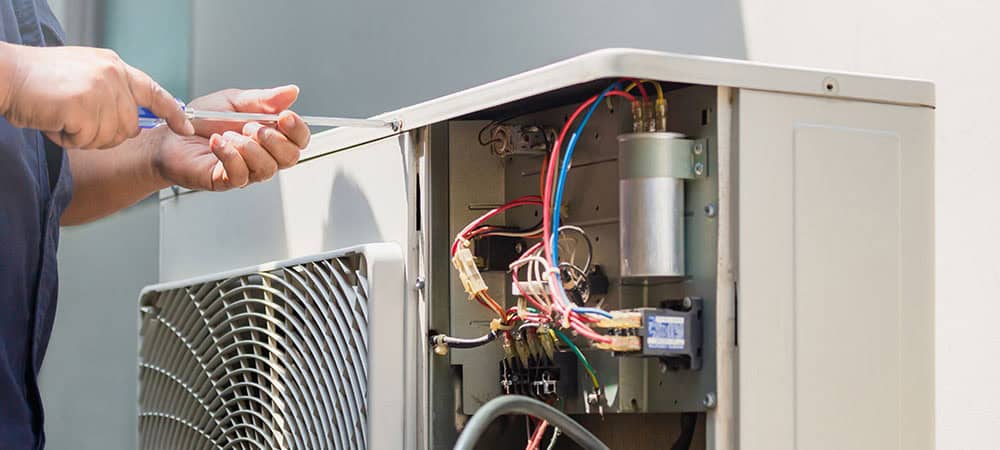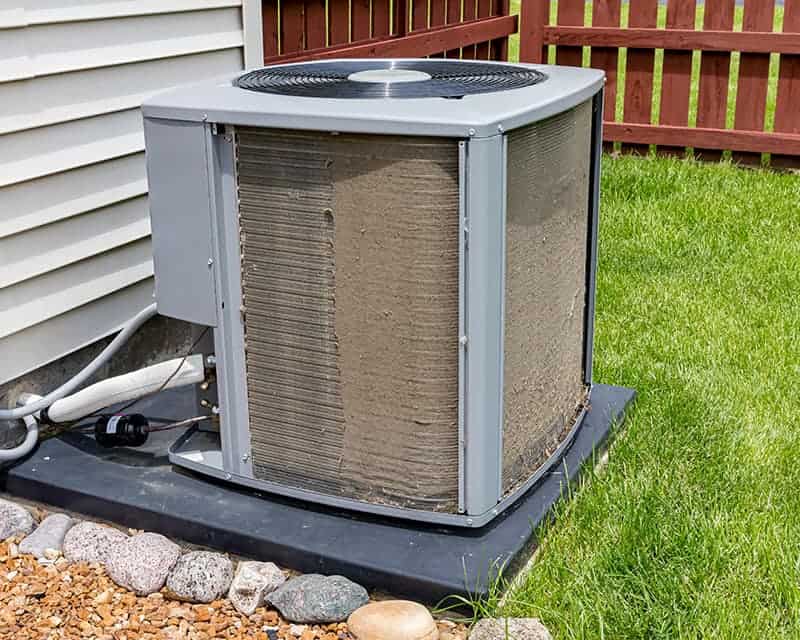Common causes of air conditioner noise include loose parts, dirty filters, improperly mounted units, debris around the unit, and bent or damaged fins. You can fix most noises by tightening screws and bolts, cleaning or replacing filters, securing unit mounts, clearing debris, and straightening fins. In addition to noise issues, air conditioners can also present various problems that affect their performance. One of the top reasons for warm air from AC units is a faulty compressor, which can prevent the system from effectively cooling the air. Other common causes include low refrigerant levels and blocked air ducts, both of which require prompt attention to restore optimal cooling. If you notice your air conditioner not blowing cold air, it’s crucial to investigate potential issues immediately. This could indicate not only a failing compressor but also problems such as a malfunctioning thermostat or a refrigerant leak. Addressing these concerns swiftly will help maintain your air conditioner’s efficiency and ensure a comfortably cool environment.
For a more thorough approach, regularly maintain and inspect your AC, focusing on small fixes before they lead to larger problems. Guarantee smooth and quiet operation by addressing these issues promptly.
Each solution depends on practical, hands-on adjustments that can largely enhance your system’s efficiency and longevity, with more insights available to tune up your approach.
Common Causes of Air Conditioner Noise
When your air conditioner starts making unusual noises, it’s often due to a few common issues. You might be dealing with loose parts that rattle as the unit operates, or debris that’s found its way inside and is interfering with the fan.
A faulty motor, misaligned fan, or worn-out bearings can create significant noise, signalling the need for maintenance or repair.
Loose Parts
Rattling from your air conditioner often indicates that internal components have become loose. This can disrupt your unit’s efficiency and increase wear and tear.
Here’s how you can tackle this issue:
| No. | Issue | Solution |
|---|---|---|
| 1. | Inspect Screws and Bolts | Regularly check and tighten screws and bolts on the exterior and access panels. Vibration can loosen these over time. |
| 2. | Secure Fan Blades | Confirm fan blades are snug and not wobbling, which contributes to noise and potential damage. |
| 3. | Check Mounting Bolts | The bolts holding your unit to the frame or wall should be tight to prevent movement and noise. |
| 4. | Examine Internal Mechanisms | Sometimes, internal parts like coils or the motor assembly may need tightening or replacement. |
Debris in the Unit
In addition to loose parts, debris accumulation within your air conditioner can also greatly contribute to noise issues. Leaves, twigs, and dirt can clog the system, causing it to work harder and produce more noise.
To tackle this, you’ll want to regularly check and clean the external components of your unit, especially the condenser fan and its surrounding area. Make sure to turn off the unit before you start cleaning to guarantee your safety.
Gently remove any visible debris and use a soft brush or a vacuum with a brush attachment to clear out finer particles. This preventive maintenance not only reduces noise but also enhances the efficiency and longevity of your air conditioner, making you feel more at ease and connected to your home environment.
Faulty Motor
A faulty motor, often indicated by a grinding or squealing noise, can greatly disrupt your air conditioner’s performance.
Here’s how to address it:
- Identify the Noise: Confirm the noise source is indeed the motor, not another component.
- Power Down: Always turn off your unit’s power before attempting any inspection or repair.
- Inspect the Motor: Check for visible signs of wear or damage. Look for burnt wires or overheated components.
- Consult a Professional: If you’re unsure about your findings, it’s wise to call a skilled technician. Safety and precision are paramount.
Misaligned Fan
Moving from motor issues, another common source of air conditioner noise is a misaligned fan. When the fan in your AC unit isn’t properly aligned, it can lead to unsettling noises that disrupt your peace.
You’re not alone in this; many homeowners face this issue. Typically, a misaligned fan will generate a rattling or buzzing sound as it struggles against its normal motion. This misalignment can stem from loose screws or a slight shift in the fan’s position due to regular wear and tear.
To fix this, you’ll want to power off your unit and carefully inspect the fan assembly. Tighten any loose screws and make sure the fan is correctly seated in its housing. It’s a simple fix that’ll bring back the quiet you miss.
Worn-out Bearings
As your air conditioner ages, the bearings may wear out, leading to a grinding or squealing noise that signifies the need for inspection or replacement. You might want to reach out to professionals.
Here’s how you can address this issue effectively:
- Identify the Noise: Listen carefully to determine if the noise is indeed from worn bearings.
- Power Down: Always turn off your unit completely before inspecting to guarantee your safety.
- Inspect Bearings: Check for visible signs of wear or damage. If the bearings look rusty or feel loose, they’re likely the culprit.
- Consult a Professional: If you’re unsure about your findings, it’s better to call in a professional who can provide a precise diagnosis and suggest the best solution.
Together, let’s keep your unit running smoothly and quietly.
DIY Fixes for Air Conditioner Noise
If you’re hearing unusual noises from your air conditioner, some basic DIY fixes can help. Start by tightening any loose screws and cleaning the unit thoroughly to remove dust and debris. If the noises persist despite your efforts, it may be time to consult with professionals. Air conditioner repair services can diagnose underlying issues that might be causing the problem, ensuring safe and effective solutions. Regular maintenance from these experts can also help prevent future disruptions and extend the life of your unit.
For persistent issues, consider lubricating moving parts or replacing any faulty components to restore quiet operation.
Tightening Screws
Check all accessible screws on your air conditioner’s casing and tighten them to reduce rattling noises effectively. Rattling often occurs when screws loosen over time due to the unit’s vibrations.
Here’s a straightforward guide to guarantee your air conditioner remains quiet and efficient:
| No. | Step | Guide |
|---|---|---|
| 1. | Locate Screws | Identify all screws on the exterior and access panels of your unit. |
| 2. | Inspect for Wear | Check if any screws are worn out and replace them with new ones of the same size and type. |
| 3. | Use the Right Tools | Employ a suitable screwdriver or wrench to avoid stripping the screw heads. |
| 4. | Secure Evenly | Tighten each screw evenly to ensure the casing is uniformly secured without warping or undue pressure. |
This simple maintenance can greatly diminish unwanted noise and foster a sense of accomplishment in managing your home environment.
Cleaning the Unit
After tightening the screws, your next step is to clean the air conditioner unit to further reduce noise and optimize performance. Start by powering off the unit to guarantee your safety.
You’ll want to remove any visible debris from around the exterior and interior compartments. Use a soft brush or vacuum with a brush attachment to gently clean the fins. Be careful not to bend them.
Next, check the evaporator and condenser coils. Dirt on these can strain the system, increasing noise. Spray them with a coil cleaner and follow the instructions for the best results.
Finally, clean or replace the air filters, as clogged filters can also cause your unit to work harder and noisier.
Joining in on these maintenance tasks not only enhances the life of your AC but also makes you part of a community committed to efficient home care.
Replacing Faulty Parts
Replacing necessary parts is a crucial step in reducing air conditioner noise and ensuring peak performance. When you’re part of a community that values a quiet and efficient home, knowing how to identify and replace troublesome components can make all the difference.
Here’s a straightforward guide:
| No. | Step | Guide |
|---|---|---|
| 1. | Identify the Problem | Listen for unusual sounds and check if the noise corresponds with specific components struggling or failing. |
| 2. | Gather Your Tools | You’ll typically need a screwdriver, a wrench, and possibly a multimeter for electrical testing. |
| 3. | Remove Necessary Parts | Carefully dismantle the required sections of your AC unit to access and remove the defective parts. |
| 4. | Install New Components | Install New Components: Securely install the new parts, ensuring they’re compatible and properly aligned. |
This practical approach not only enhances your system’s efficiency but also deepens your connection with your home environment.
Lubricating Components
To minimize air conditioner noise, regularly lubricate moving parts like fan motors and bearings. This simple maintenance task can prevent a lot of the common grinding and squealing noises that you might hear. It’s something you can do yourself, and it makes a big difference.
First, confirm your AC unit is completely powered off to avoid any accidents. Locate the oil ports, typically found on the fan motor and sometimes on the compressor. Use a non-detergent lubricant specifically designed for electric motors—other types can cause damage. Additionally, if the fan motor is not operating smoothly after lubrication, it may indicate a need for further inspection or replacement. Understanding why your AC fan isn’t working can help you identify potential issues like a blown fuse or faulty wiring. Regular maintenance, including lubrication, can extend the life of your AC unit and improve its efficiency.
Apply just two to three drops per port; over-lubricating can attract dirt that leads to more issues.
Preventative Maintenance Tips to Avoid Noise Issues
To keep your air conditioner running quietly and efficiently, it’s crucial to engage in regular maintenance.
You should clean your unit periodically and schedule seasonal inspections to preempt noise and other issues.
This proactive approach can save you from unexpected repairs and prolong the lifespan of your system.
Regular Cleaning
Regular cleaning of your air conditioner’s filters, coils, and fins is essential to prevent noise and maintain efficiency. When these components collect dust and debris, they can restrict airflow and cause your unit to work harder, which often leads to noisy operation.
Here’s how you can keep your AC clean:
- Check and replace the air filters monthly during high-use seasons. Clean filters guarantee unobstructed airflow and less strain on your system.
- Clean the coils every spring to remove any dirt that has accumulated, which can impact the efficiency and sound of your unit.
- Inspect the fins regularly, straightening any bent ones that can impede airflow and increase noise.
- Clear debris from around the unit to maintain unrestricted airflow and reduce potential noise hazards.
Seasonal Inspections
Scheduling seasonal inspections for your air conditioner can greatly reduce unexpected noise issues and enhance its longevity. By staying proactive, you’ll guarantee your system’s efficiency and avoid the discomfort of a noisy breakdown. Here’s a simple checklist to keep in mind:
| Season | Task | Why It Matters |
|---|---|---|
| Spring | Check refrigerant levels | Prevents inefficient cooling and noise |
| Summer | Inspect and clean coils | Ensures peak airflow and reduces strain |
| Fall | Test thermostat and controls | Confirms system responsiveness and quiet operation |
What to check each season
As seasons change, it’s important you check your air conditioner’s filter and replace it if necessary to prevent airflow blockages and reduce noise.
You should also verify refrigerant levels to guarantee efficient operation and minimize strain on the system.
Confirm that your unit is properly installed, as misalignment can lead to unusual vibrations and noise.
Filter Replacement
You should check your air conditioner’s filter each season to make sure it’s clean and functioning efficiently. A clogged or dirty filter not only reduces airflow but can also cause your system to work harder, leading to unnecessary noise and decreased efficiency.
Here’s what you’ll need to do:
- Locate and Remove the Filter: Check your user manual for specifics on how to access the filter.
- Inspect for Dirt and Damage: Look for excessive buildup or tears.
- Clean or Replace: Wash reusable filters with mild detergent or replace disposable ones as needed.
- Reinstall Properly: Make sure it fits snugly without any gaps around the edges.
Staying on top of this simple maintenance task helps keep your air conditioner quiet and effective.
Checking Refrigerant Levels
After ensuring your filter is in good condition, it’s important to check the refrigerant levels in your air conditioner each season to maintain peak performance. Low or leaking refrigerant can cause your unit to work harder, increasing wear and potentially leading to more serious issues. It’s vital you monitor levels closely.
If you’re not sure how to check, consult your AC’s manual or call a professional. They can perform a pressure check and inspect for leaks. Remember, it’s not just about keeping your unit running smoothly—it’s about being part of a community that values smart, sustainable living. Understanding how to maintain your AC unit can help prevent common causes of compressor failure, ensuring your system operates efficiently for years to come. Regular maintenance not only extends the lifespan of your unit but also enhances its energy efficiency, leading to lower utility bills. By taking proactive measures, you contribute to a healthier environment and promote sustainability in your community.
Stay proactive and keep your AC in top shape, ensuring comfort and efficiency all season long.
Ensuring Proper Installation
Guarantee proper installation of your air conditioner by checking mount stability, correct alignment, and secure connections each season to prevent operational issues. Regular maintenance is key in guaranteeing your AC not only runs quietly but also efficiently.
Here’s what you should check:
- Mount Stability: Ensure the unit is firmly anchored. Any movement can cause vibrations leading to noise.
- Alignment: Verify that the AC is level. An unbalanced unit can lead to premature wear and tear.
- Connection Tightness: Check all connecting bolts and screws to guarantee they haven’t loosened over time.
- Clearance: Maintain clear space around the unit. Obstructions can disrupt airflow and increase noise levels.















